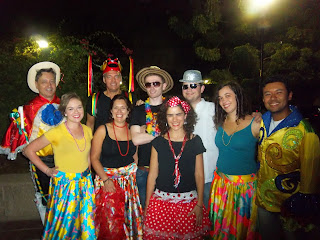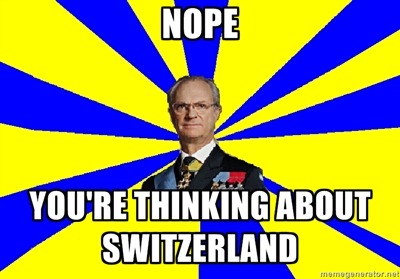When I was young, I used to watch a cartoon on Sunday mornings called the Rocky and Bullwinkle Show, about a flying squirrel and a moose who try to stop the evil Soviets Boris Badenov and Natasha Fatale from evilly committing evil deeds. But interspersed throughout the program were several other, shorter and unrelated cartoons. One was called Fractured Fairy Tales, where a narrator tells a familiar tale (Cinderella, Hansel & Gretel, etc.), updated with unexpected twists.
Well, South America is a place full of legends and myths. So I'd like to try my hand at updating and funkifying a myth from the Guajira, called the Origin of Fire. This myth about the origin of fire is
taken from Jose Enrique Finol's book "Mito y Cultura Guajira"
(Universidad de Zulia, 1984).
It not only relates how the brave and
resourceful Junuunay stole fire from the cave of the creator god
Maleiwa, but also the origin of the firefly, and the dung beetle. It also signals the best kinds of wood to rub together to
make a fire. So if you're ever stuck without a fire in the cold desert
night of the Guajira Peninsula, seek out the caujaro tree and get
rubbing.
---------------------
In the beginning, there was no fire. The people never prepared food and ate their arepas raw, their meat dried, and their smores unmelted. They were forced to lick their cigarettes, which satisfied no one.
These pitiful people lived in trees and caves and holes like animals. They were afraid of darkness. They went to bed at seven o'clock at night and never went to discoteques. The Spaniards found them quite a bore.
The Wayuu creator god, Maleiwa, had fire. He was the only one. He kept his burning stones in a secret cave. He went there to warm his hiney and his food, and to smoke his Marlboros. We wasn't afraid of the dark, so He went dancing 'til dawn. With the Spaniards.
Maleiwa didn't want the people to have fire. They might make steam engines and bananas Foster and Molotov cocktails. No, these humans could not be trusted.
But
one chilly night, when Maleiwa was warming His divine bones next to the fire, a young man named Junuunay came towards Him and the cave entrance, trembling. Maleiwa was not happy.
"Hey you, trespasser ! Don't you know this cave is a no-go zone? It's where I keep my awesome magic fire-stones, fool ! My tush is already getting frosty, thanks to you ! Leave me !"
"No, have pity on me," Junuunay answered, pleadingly. "It's colder than a witch's titty outside, and I lost my opposum loin cloth and iguana-skin boots in the village poker game. I only wish get a wee bit of warmth on my skin and in my bones. And then I will leave. If you've got any whiskey, I'd love a sip, too.
But Junuunay was quite the sneak; he used all of cunning tricks to
convince Maleiwa. He made his teeth chatter, he gave himself goose bumps, he shivered like a lizard, and he
rubbed his hands together until, finally, Maleiwa felt sorry for this hapless fellow and decided to let him in.
Both of them were rubbing their legs, rubbing their hands, and blowing into their hands. Gettin' warm. Junuunay's boldness grew with his warmth. Suddenly, Junuunay exclaimed, "Maleiwa, look out ! It's your wife and she looks pissed !" Maleiwa got scared and looked off into the distance. Using this distraction, Junuunay grabbed two fire-stones, threw them in his satchel and bolted into the night.
Maleiwa, who wasn't married, realized He had been tricked and robbed. His urge to punish humans rising, He set off after Junuunay. "Ooohh, I'm gonna transform that varmint into an insect and make him eat dung."
Junuunay was a fast runner, but not nearly as quick as the creator god. And so he gave one of the fire-stones to his friend Kenaa. Kenaa took one of the stones and ran away unseen. You see, he was indistinguishable from the other humans during the daytime, but at nighttime, his stone shone and gave away his whereabouts. So the next night, Meleiwa discovered him and turned him into a firefly to punish him. Maleiwa liked to turn people into insects...which is why there so many insects in this part of the world.
Junuunay, also a fan of insects, found Jimut, the talking grasshopper. "Hey buddy, the almighty Maleiwa is on my tail 'cause I stole some fiery rocks from His lair. Here, take this last piece and hide it."
Jimut was called the talking grasshopper because he could understand the Wayuu language. But he was a mute. He just shook his little head and jumped in a Caujaro tree. Then he jumped to another Caujaro tree and to another, spreading the magic of the stone to all the trees. He also burned down a few forests in the process, starting the irreversible desertification of the Guajira. Thanks Jimut.
One day the people saw Jimut, the mute talking grasshopper, in the tree, rubbing two sticks. Small grasshopper-sized sticks. They tried it, too, and a flame appeared. The people were so happy that they had fire. Now they could cook their meals, smoke their Pall Malls, or burn down their enemies' huts.
Well Maleiwa did turn Junuunay into a dung beetle as promised, which made the creator feel real good for awhile. But the mute talking grasshopper was already an insect and thus immune from Maleiwa's favorite spell. And, Maleiwa, with a Jehovian temper, was fed up with this insect-infested peninsula where the ungrateful inhabitants didn't even make monuments in His honor. He was feeling mean, so called up His friends the Spanish and asked if they were interested in acquiring some real estate on the coast.
And he left the Guajira to relocate to a great little island known as the Tierra del Fuego. Sounds cozy.

 So I did some very brief research. Apparently, the Christ-child is all Martin Luther's
So I did some very brief research. Apparently, the Christ-child is all Martin Luther's 




































